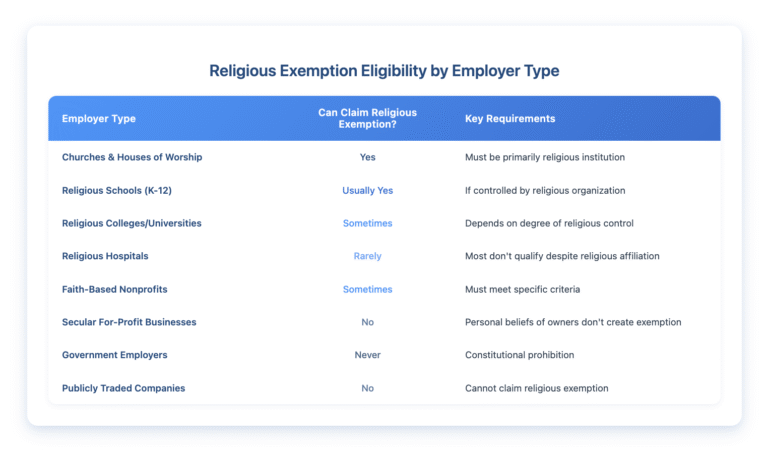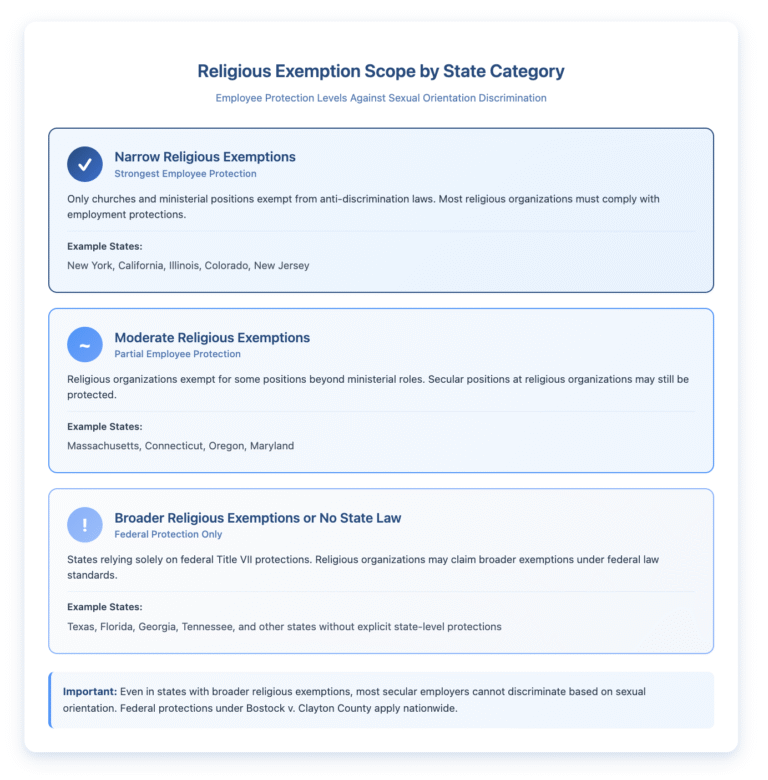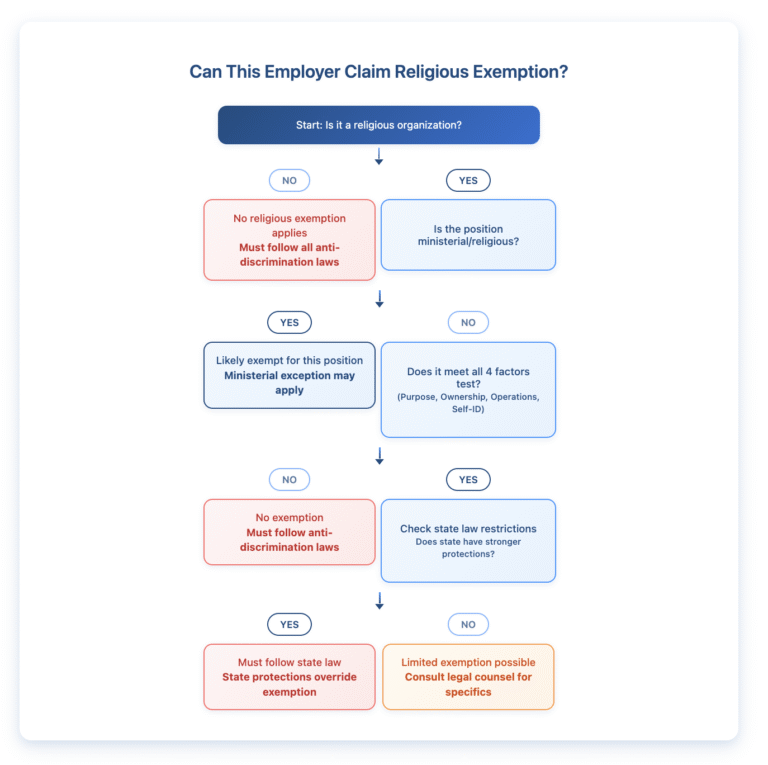Your employer just denied you a promotion, claiming their religious beliefs prevent them from “endorsing” your sexual orientation. But here’s what they might not want you to know: most employers can’t use religion as a shield for discrimination.
The law draws clear lines between legitimate religious exemptions and illegal discrimination, and those lines might surprise you. Let’s break down exactly when religious beliefs can and can’t override your workplace rights.
Disclaimer: This article provides general information for informational purposes only and should not be considered a substitute for legal advice. It is essential to consult with an experienced employment lawyer at our law firm to discuss the specific facts of your case and understand your legal rights and options. This information does not create an attorney-client relationship.
The Bottom Line: Most Employers Can't Claim Religious Exemptions
Despite what some employers might claim, the vast majority of businesses cannot use religious beliefs to discriminate based on sexual orientation. The Supreme Court made this crystal clear in Bostock v. Clayton County (2020), ruling that Title VII’s prohibition on sex discrimination includes sexual orientation discrimination.
Your local bakery owner’s personal religious beliefs? They don’t create an exemption. Your manager’s faith-based objections? Still illegal discrimination. Even companies that call themselves “Christian businesses” usually can’t discriminate unless they meet very specific legal criteria.
Who Actually Qualifies for Religious Exemptions?
The religious exemption to Title VII is narrow and specific. Only certain types of employers qualify, and they must meet strict legal tests.

Understanding the Ministerial Exception
The strongest religious exemption is the “ministerial exception.” This allows religious organizations to discriminate when hiring employees who perform religious functions. But it’s much narrower than many employers claim.
The Supreme Court clarified this in Our Lady of Guadalupe School v. Morrissey-Berru (2020). Even at religious schools, only employees who perform “vital religious duties” qualify as ministers. A math teacher at a Catholic school? Probably not covered. The school’s chaplain? Likely covered by the exception.
The Four-Factor Test for Religious Organizations
When determining if an organization qualifies for religious exemptions beyond the ministerial exception, courts typically examine four factors:
- Purpose: Is the organization’s purpose primarily religious?
- Ownership: Is it owned or affiliated with a formal religious entity?
- Operations: Do day-to-day operations reflect religious beliefs?
- Self-identification: Does it hold itself out as religious to the public?
Missing even one factor can disqualify an employer from claiming religious exemptions.
For-Profit Businesses: Where Religious Freedom Hits a Wall
The Hobby Lobby case (2014) created confusion about religious rights for businesses. But that case dealt with contraception coverage, not employment discrimination. When it comes to sexual orientation discrimination, for-profit businesses face a much higher bar.
Your employer’s CEO attending church every Sunday doesn’t create a religious exemption. A company having a “faith-based mission statement” isn’t enough either. Unless the business is explicitly organized as a religious corporation (extremely rare), they must follow anti-discrimination laws.
State Laws Often Provide Stronger Protection
Even when federal religious exemptions might apply, state laws often provide stronger protections. Twenty-two states plus D.C. have explicit sexual orientation protections, many with narrower religious exemptions than federal law.

Spotting Pretextual Religious Claims
Some employers suddenly discover “religious objections” when convenient. Courts are wise to this tactic and look for signs of pretext—when religion is used as a cover for illegal discrimination.
Red flags that suggest pretextual religious claims include:
- Inconsistent application of religious principles
- Timing that coincides with learning about your sexual orientation
- Selective enforcement against LGBTQ+ employees only
- No history of religious practices in the workplace
- Religious objections that only arise during legal disputes
The Inconsistency Test
Courts examine whether employers apply religious principles consistently. An employer who claims religious objections to same-sex relationships but ignores employees who divorce, live together unmarried, or violate other religious tenets? That inconsistency suggests discrimination, not genuine religious belief.
The EEOC emphasized this in guidance following Bostock: selective enforcement of religious beliefs against LGBTQ+ employees while ignoring other “sins” indicates illegal discrimination.
When Religious Organizations Cross the Line
Even legitimate religious organizations can’t discriminate in all circumstances. They lose exemptions when they:
- Accept federal funding (in many cases)
- Operate secular businesses
- Hire for non-religious positions
- Engage in commercial activities
The Federal Funding Factor
Religious organizations that accept federal grants or contracts often must follow federal non-discrimination rules. Executive Order 11246, as amended, prohibits federal contractors from discriminating based on sexual orientation or gender identity—even religious contractors in most cases.
The Supreme Court’s decision in Fulton v. City of Philadelphia (2021) created some uncertainty, but it dealt with specific contract language, not broad exemption rights.
Healthcare and Religious Hospitals: A Complex Landscape
Many hospitals have religious affiliations, but few qualify for religious exemptions. The key question: Is healthcare or religion the primary purpose?
Most religious hospitals must comply with employment discrimination laws because:
- They serve the general public
- They employ people of all faiths
- They accept Medicare/Medicaid funding
- Their primary function is medical care, not religious instruction
Universities and Colleges: Title IX Complications
Religious colleges face a patchwork of rules. While some can claim Title VII religious exemptions for employment, Title IX creates additional complications for those receiving federal education funds.

Building Your Case Against Invalid Religious Exemption Claims
If your employer claims religious exemptions, document everything. You’ll need evidence showing:
Start with the employer’s corporate structure. Is it actually organized as a religious entity? Check state incorporation records—they’re public documents. Most businesses claiming religious exemptions aren’t legally structured as religious organizations.
Document the employer’s practices. Do they hold religious services? Require religious participation? Employ people of different faiths? The more secular their operations, the weaker their exemption claim.
Evidence That Defeats Religious Exemption Claims
Focus on gathering:
- Employee handbook policies (or lack of religious requirements)
- Job postings that don’t mention religious requirements
- Diversity of employee religious backgrounds
- Secular business operations and services
- Marketing materials presented as a secular business
- History of LGBTQ+ employees before your situation
- Inconsistent enforcement of alleged religious rules
The Hobby Lobby Confusion: What It Doesn't Mean
Many employers misunderstand Burwell v. Hobby Lobby Stores (2014). That case allowed closely-held corporations to claim religious exemptions from contraception coverage requirements. It didn’t create a blanket right to discriminate.
Critical differences for sexual orientation discrimination:
- Hobby Lobby dealt with benefits regulations, not anti-discrimination laws
- The government had alternative means to provide contraception coverage
- No alternative exists for workplace discrimination protection
- Courts apply stricter scrutiny to discrimination claims
The Masterpiece Cakeshop Misunderstanding
Masterpiece Cakeshop v. Colorado Civil Rights Commission (2018) is often misunderstood. The Supreme Court ruled narrowly based on perceived religious hostility by the Commission, not broad religious rights to discriminate.
The decision explicitly stated it didn’t create a general religious exemption to discrimination laws. Employers citing Masterpiece as justification for discrimination are likely misreading the law.
Practical Steps When Facing Religious-Based Discrimination
If your employer invokes religious beliefs to justify discrimination, take these immediate steps:
Document the religious claim. Get it in writing if possible. If stated verbally, send a follow-up email: “To confirm our conversation, you stated that due to religious beliefs…”
Research your employer’s status. Check if they’re truly a religious organization. Look up their tax-exempt status, corporate filings, and mission statements.
Examine consistency. Document how the employer treats other religious issues. Do they enforce all religious principles equally, or just those affecting LGBTQ+ employees?
Know Your State and Local Protections
Research your state and local laws immediately. Many jurisdictions provide stronger protections than federal law, with narrower religious exemptions.
Some localities prohibit discrimination even by religious organizations for non-ministerial positions. New York City, for example, provides broader protections than New York State.
When Religious Freedom and Equal Rights Intersect
The law seeks to balance religious freedom with equal employment rights. But that balance has clear limits: religious beliefs don’t override civil rights laws for most employers.
Understanding these boundaries helps you recognize when an employer’s religious exemption claim is legitimate versus when it’s illegal discrimination wearing a religious mask.
The Accommodation Alternative
Sometimes, employers must accommodate both religious employees and LGBTQ+ employees. This might involve scheduling adjustments or reassignments that respect everyone’s rights without permitting discrimination.
But accommodation has limits. An employer can’t “accommodate” one employee’s religious beliefs by discriminating against another employee’s sexual orientation.
Red Flags That Suggest Illegal Discrimination
Watch for these warning signs that religious exemptions are being misused:
- Sudden discovery of religious objections after years of operation
- Religious rules that only apply to LGBTQ+ employees
- Exemption claims by clearly secular businesses
- Inconsistent religious practices across the organization
- Religious objections that conveniently align with business preferences
Moving Forward: Protecting Your Rights
Religious exemptions to sexual orientation protections are far narrower than many employers claim. Most businesses—even those with religious owners or missions—cannot legally discriminate based on sexual orientation.
If you’re facing discrimination disguised as religious freedom, you have options. Document everything, research your employer’s actual status, and understand that the law likely protects you.
Take Action Today
Don’t let invalid religious exemption claims deny you equal treatment. The law recognizes the difference between genuine religious organizations and businesses trying to avoid discrimination laws.
Contact Nisar Law for a consultation about your sexual orientation discrimination case. With proper legal guidance, you can challenge improper religious exemption claims and secure the equal treatment you deserve. Your right to workplace equality doesn’t disappear because of someone else’s religious beliefs—and the law backs you up.


